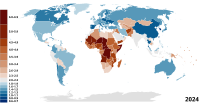
Photo from wikipedia
New variants of the severe acute respiratory syndrome coronavirus 2 (SARS-CoV-2) with high effective reproduction numbers are continuously being selected by natural selection. To establish effective control measures for new… Click to show full abstract
New variants of the severe acute respiratory syndrome coronavirus 2 (SARS-CoV-2) with high effective reproduction numbers are continuously being selected by natural selection. To establish effective control measures for new variants, it is crucial to know their transmissibility and replacement trajectory in advance. In this paper, we conduct retrospective prediction tests for the variant replacement from Alpha to Delta in England, using the relative reproduction numbers of Delta with respect to Alpha estimated from partial observations. We found that once Delta’s relative frequency reached 0.15, the date when the relative frequency of Delta would reach 0.90 was predicted with maximum absolute prediction errors of three days. This means that the time course of the variant replacement could be accurately predicted from early observations. Together with the estimated relative reproduction number of a new variant with respect to old variants, the predicted replacement timing will be crucial information for planning control strategies against the new variant.
Journal Title: Viruses
Year Published: 2022
Link to full text (if available)
Share on Social Media: Sign Up to like & get
recommendations!